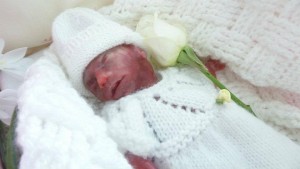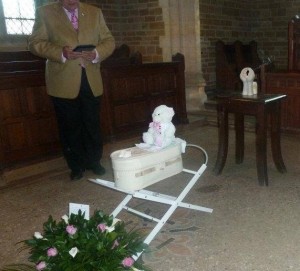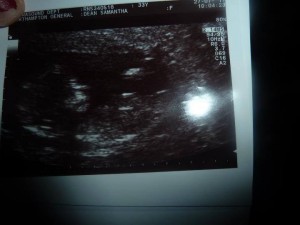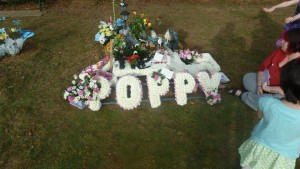Disenfranchised Grief
Memoirs of a Cancer Orphan
Today’s guest post is written by Lynsie Lee:
They say you can’t help someone if they don’t want it for themselves. You can shove resources into their face, offer time, money, every ounce of yourself. But if they don’t want help, there is nothing you can do. Sadly, this is the case with my mother while she is dying from cancer.
Maybe she’s in denial. Maybe she is still trying to be the strong, independent woman that raised six children on her own. But now, when I walk into her dark, dingy apartment – the smell of old dishes and mildew filling my nostrils – I feel like maybe she just wants to die.
She has disconnected herself from us; much like when she was an alcoholic. We don’t know how to feel, what to say to her, how to help her. She has abandoned my siblings and I and it’s beginning to feel like she is already gone.
My family has always been the epitome of dysfunction. Our mother kept us from knowing relatives, so none of us have ever dealt with a death in the family. Questions, stresses and frustrations all swarm my mind when I think about when she actually does pass- not fully for the pain of the loss of my only parent, but for the realization that we will have to plan a funeral. The dread of needing to clean up an apartment that has been hoarded in for nearly 30 years. There’s also the weight on our shoulders of what to do with our eldest sister who still lives there because of psychiatric issues that our mother chose to neglect and refused to address. My mom is choosing to let herself die and leaving us to handle all of the issues she never could.
I’m not angry with her, which I know is a stage of the grieving process. I refuse to have anger toward somebody that did what she could with what she had (mentally, emotionally and physically). I spent enough of my childhood and adolescent being mad at her, hating her, wishing she would die. But now she is dying and it kills me to think that this is what she wants.
It kills me to see her curled up in a fragile ball on a couch surrounded by boxes with all of the light bulbs in her home burnt out. It kills me that my eldest sister has to live in these conditions and see this image every hour of every day. And it kills me that my mom refuses to let us improve this.
I’ve been grieving publicly for a few weeks and while it does mean a lot to me when I receive condolences, or when others relate with their own personal losses to cancer, I still feel alone in the fact that my mom is dying in these conditions. She’s choosing to be alone in these conditions. She’s choosing to abandon her children when she is all we have ever had.
I tried expressing to her the other night that I was sad and scared and she told me to leave her alone, that she just wanted to rest. You can’t help someone who won’t accept it. My mother doesn’t want help. My mother wants to die.
*****
From Caleb: As a funeral director, I’ve had to learn to control my emotions. Not because I’m a selective empathetic, but because grieving families need me to be the level head in the midst of grieving souls. But I couldn’t control my emotions when I first read this post. I cried. I cried because Lynsie pulled me into her story. I cried because I’ve served families whose loved one’s have chosen to die alone. By their own choice. I’ve seen the empty pain in those left behind. The helpless pain. The grief that has been disenfranchised by the one who has died. When someone chooses to die along, it leaves behind a lonely grief. An orphaned grief.
I hope this post finds its way to other “orphans” because I know it will give them a small sense of comfort, knowing that although your loved one has barred you from grieving, there’s a community of the lonely … an orphanage for the lonely grievers.
Thank you Lynsie for being willing to share.
The Disenfranchised Grief of Abortion
Disenfranchised grief is grief that is not recognized by society. One MAJOR type of disenfranchised grief that I often mention is the result of stillbirths and miscarriages.
A grief for one who had no connections in life. No schoolmates, no friends, no co-workers … all of which translates to no funeral. A grief that can’t be shared.
A grief to be borne solely by the ones who conceived. A grief that is carried by the one who may now feel guilt upon silent grief because she miscarried.
This is a grief that is often carried alone. A grief that is too often complicated by guilt. A grief that is private and difficult to share. A grief for a nameless soul.
Yet, there is a movement to recognize this grief. Mothers who have miscarried call us at the funeral home and request some public funeralization for their miscarried/stillborn child. Some even request a public viewing if the child is far enough along in it’s development. This movement to have funerals — whether through a funeral home or simply in a small private service — is a movement that provides a positive outlet for the grief of the parents and siblings. It recognizes a traditionally disenfranchised grief.
So, why isn’t there a movement to memorialize/remember abortions (The book, “Liquid Life: Abortion and Buddhism in Japan” explores abortion remembrance in Japanese culture)? Here’s some reasons why abortions might not be memorialized:
Obviously, the political contentiousness of the topic doesn’t help.
There’s the idea that the fetus is not a thing to be grieved.
There’s guilt factors,
there’s shame factors (one night stands, rape, incest),
and there’s trimester factors (the fetus could have been only a couple weeks old).
And, there’s the fact that abortions are VERY private decisions, that aren’t meant for public appraisal. How much would a woman / couple be shamed, guilted, chastised and questioned if there was a public funeral for an abortion?
And yet we have this from a discussion thread at Steady Health:
I am 31 and desperately wanted to have a child with my partner. Last month I found out that I was pregnant and I was surprised to feel absolutely nothing positive about the fact. After the initial shock wore off all I felt was indifference, fear and depression. The sight of women with babies etc. provoked feelings of nausea… I took this to mean that I didn’t actually want the baby and last week i had an abortion. Now that my body is returning to its normal state I feel exactly the way that i did before I found out that I was pregnant! I don’t understand how it’s possible to feel so emotionally estranged from myself during pregnancy. Is it possible that this happened because of pregnancy hormones? I feel like my body betrayed me. I wanted that baby. Has anyone else experienced anything similar to this? It’s very disturbing…
And this was one of the nearly 100 replies — most of similar nature — to the above post:
I too have recently had an abortion and am having those same feelings of regret and grief. i have always wanted a family more than anything, am in a committed loving relationship and would even go so far as to say that I disagree with abortion – and yet, i fell pregnant unplanned, got scared at the timing of it all and the consequences of it, and before i knew it, I’d done it.I cry a lot. I feel empty inside, like there is a big hole inside of me that won’t go away. I feel the desire to have another baby, soon, after my wedding, earlier than we had ever planned. I ache all the time and it’s as though my body misses being pregnant (even though I was so sick). I’ll be having a happy day and then suddenly i’ll break down into a flood of tears, racking sobs that shake my whole body and i feel an indescribable ache in my chest.
I worry that when i do have another baby that it won’t fix the real problem of the baby that I made the decision not to keep.
One of the problems with politicizing abortion is that when it becomes part of a platform we forget that there are REAL people involved, who are parting with a REAL part of themselves and who will likely experience some type of REAL grief.
I understand that just as some don’t experience grief over miscarriages so not everyone will experience grief over an abortion. I know some woman who have celebrated their abortions.
Yet, it IS important to recognize that abortions may likely cause a type of disenfranchised grief that if not recognized will cause psychological difficulty. And if the grief goes unexpressed, may cause intense, unintended emotional consequences.
It’s time to give talk about our abortions to people we can trust. And it’s okay to grieve apart of you that is no more.
Breaking the Isolation of Stillbirth
Today’s guest post is written by Samantha Allington.
****
On Thursday 8th September 2011 I was 19 weeks and 3 days pregnant when my waters broke at home. I knew in that instant that my baby wouldn’t survive but I still wanted to hang on to the little bit of hope that some miracle would happen and my pregnancy would proceed safely against the odds.
I was rushed in to hospital by my birth Doula where I was checked over by the doctor who confirmed I had lost amniotic fluid. After a scan to measure the fluid levels I was told there was not enough water to support my baby’s lung development and that due to diabetes I was at high risk of death too.
I had to face the hardest decision of my life and after spending from then till the Monday following refusing outright to terminate my pregnancy, I finally conceded to allow the medical team to induce labour at just 20 weeks gestation. There would be no intervention to save my baby as I was under 24 weeks pregnant and hospital policy didn’t permit resuscitation at that age.
I was in an abusive relationship with a violent partner and I chose to go through labour and birth with only my Doula present. It was a harrowing experience to say the least but I was still determined to make my baby’s birth as natural and beautiful as I could. I wanted it to be special and memorable, for my last moments with my baby to be precious.
We had a candle lit room (LED tea lights and colour changing lotus flowers), aromatherapy, crystals and the Obstetrician permitted me to have a natural birth without any electronic monitoring (no wires or drips) so that I could move around freely. The midwives allowed us the space we desired and only came in to check once in a while how contractions were developing.
Finally it was time to give birth and despite holding on for as long as I could refusing to push, my daughter finally entered the world at 5:28am on 14th September 2011 at just 20 weeks and 2 days gestation as the sun was rising.
She was about the size of a Barbie doll at just 20cm length and weighing a tiny 10.5 ounces. Despite her tiny size she was perfect in every way, with ten fingers, ten toes, perfectly formed ears and a little pink nose, I even noticed in the right light she had the fairest eyelashes I’d ever seen.
 I spent 2 days alone with her in the hospital, holding her, kissing her and trying to take in every little feature so that it would be burnt to memory forever. I didn’t want to let her go or say goodbye, I wanted those days to go on and never end, but of course they did end and I had to leave the hospital.
I spent 2 days alone with her in the hospital, holding her, kissing her and trying to take in every little feature so that it would be burnt to memory forever. I didn’t want to let her go or say goodbye, I wanted those days to go on and never end, but of course they did end and I had to leave the hospital.
Arriving home it was time to start planning her funeral, she’d never get a birthday, Christmas, Easter or a wedding day, her funeral was the only special occasion she would ever have, and the only thing I could do for her to make it as important and special as I could. I contacted the charity Children Are Butterflies who work alongside B Hollowell and Sons funeral directors. They fund children’s funerals and the lady that runs it was lovely.
Due to the abusive relationship I was in, I was again alone in planning my daughter’s funeral but Ann made everything go easier and smoother. She was so kind and supportive towards me and I know I will be eternally grateful to her for all she did.
 The funeral was beautiful. We had a Hearse that was made from an old London black cab to take Poppy-Rose to her last resting place and a beautiful white woollen coffin with an embroidered name plate. The funeral was white, pink and butterfly themed. Poppy’s coffin looked so tiny at the front of the chapel resting on a Moses basket stand that was far too big. We read poems and I gave her Eulogy before moving to the graveside for her internment. Each guest was given an incense stick to light and place in the ground around her grave and a paper butterfly to write a message on for her. As we said goodbye a beautiful red butterfly flew across her grave, unusual for the time of year here in England.
The funeral was beautiful. We had a Hearse that was made from an old London black cab to take Poppy-Rose to her last resting place and a beautiful white woollen coffin with an embroidered name plate. The funeral was white, pink and butterfly themed. Poppy’s coffin looked so tiny at the front of the chapel resting on a Moses basket stand that was far too big. We read poems and I gave her Eulogy before moving to the graveside for her internment. Each guest was given an incense stick to light and place in the ground around her grave and a paper butterfly to write a message on for her. As we said goodbye a beautiful red butterfly flew across her grave, unusual for the time of year here in England.
I wanted to share my story because often talking about baby loss is considered taboo but especially in cases of termination for medical reasons. This leaves so many women (and families) feeling isolated and alone in their grief. I wanted a chance to give my side of the story, to show you how much we all need that little bit of help, compassion and love. We don’t all have family to stand by us; some of us feel so alone in our grief. We go through all the usual feelings such as sadness, despair, anger but often we also feel guilt and self-blame and this can only be made worse when we are silenced by others negative judgements , we need to be allowed to speak out and to share our stories, our personal journeys with others.
Remembering the Unremembered
Many of us have the gift of moving through the grief process as we find a way — often after years and years of remaking — to put grief to a restless slumber.
Anne Lamott writes,
“You will lose someone you can’t live without, and your heart will be badly broken, and the bad news is that you never completely get over the loss of your beloved. But this is also the good news. They live forever in your broken heart that doesn’t seal back up. And you come through. It’s like having a broken leg that never heals perfectly—that still hurts when the weather gets cold, but you learn to dance with the limp.”
It only takes something small … maybe a smell, a scent that reminds us of our loved one; or a picture; an activity to cause an overflow of the deep well of tears to burst forth from the depths. Even after years, grief is always at the surface. Tears we had momentarily forgotten about, feelings we had buried with the everyday activities that we’ve used to help us move on, and then it happens. Our buried, bruised soul awakens.
Grief sleeps lightly; ready to be awoken by the slightest touch.
But there’s a grief that doesn’t sleep.
A grief that has no beginning and seemingly no end. A grief that may never heal.
****
I walked into the hospital, carrying my toolbox-sized brown box by the handle. Dressed in my suit, tie, and dress shoes, I get awkward glances from the observant staff as they process “A man dressed for business … carrying what appears to be a toolbox … in a hospital.”
I walk into medical records, Maria the secretary recognizes me from previous visits and she asks, “Who are you here for?”
“Baby X”, I say.
She tells me to take a seat as she rummages through her files.
After a minute or so she arises from her paperwork, finds what she needs and makes eye contact with me, signaling me to come closer.
“Here’s the release. I’ll call the security guard”, she says.
“Great!” I say cheerfully, thankful that process seems to be going more smoothly than expected.
“One more thing … who’s going to sign the cremation authorization?” I ask. “I was told that the case worker was going to sign it. Is she here?”
After another minute of rummaging and five minutes worth of phone calls, “No, the caseworker’s not here.”
“Here comes the obstacles” I think to myself.
I explain what’s going on, making sure Maria fully understands the situation: “The mother’s in jail, so she terminated her rights to her newborn ….”
Maria interrupts, “I understand the child lived for an hour.”
“ … being that the mother is in jail, with no money and no family who wants to give the child a funeral, we were asked by the mother’s case worker if we’d cremate the child pro bono. We agreed … but I still need a signature for cremation authorization from whoever the rights were given to ….”
“Okay. Let me make some phone calls.”
Ten minutes later I was walking to the morgue carrying my little brown box by the handle, having resolved the situation.
As I entered the morgue, and gently placed the dead infant in my box, I couldn’t help but think about how the mother of this child will process her grief. It will be an apparition. Here and there. Such a short beginning with no closure.
****
These thoughts have haunted me over the past couple weeks, so I want to do something right here and now, with you present. I want to remember this short life by offering the only act I know to do. I’d like to write an obituary.
Baby X, passed into and out of this world on Sunday, January 8th, 2012 at the Chester County Hospital. He is survived by his mother, who cared for him for nine months, had the chance to name him upon his birth and who has been thinking about him ever since.
Although your time was short on this earth, you have not gone unremembered. Today, I remember you. Today, we remember you. In our silence, we remember.
*****
I originally wrote this post as a guest post for one of my favorite people, Joy Bennett. Joy’s blog is “Joy in this Journey” and you can like her work on facebook.
Disenfranchised Grief: The Unrecognized Mourners
When an individual dies, that death throws a web of relationships out of balance, causing the bereaved to *attempt* to find a new homeostasis. This disrupted “new normal” is best found together in community.
When grief isn’t shared. When there is no community to share it. When it isn’t recognized by society, then grief becomes complicated.
There is grief that is produced by “deaths” (both literal and real) in our society that aren’t recognized. This kind of grief is a disenfranchised grief.
Here are a couple forms of grief that simply aren’t validated by society:
1. Grief from miscarriages. This is a silent grief. A grief that few people share; and when they do share, few people show compassion. And while the mother may have the greatest form of disenfranchised grief, the father can also be the silent sufferer as he is sometimes thrust in the supporting role, being unable to deal with his own emotions.
2. Death of a pet. Pets become part of the family; and when they die it’s almost like losing a family member, except no one in the community recognizes your loss. ”It’s just a dog” is both true and false.
3. Grief from abortions. This topic has become so political that it has lost its human element. Abortions hurt. And the mothers who choose abortions will often grieve. Even if they don’t grieve at the time of the abortion, they will often grieve later in life.
4. Grief of the supporter. When death occurs, roles quickly play out. There’s the main mourner(s) and there’s the supporting cast. That supporting cast — those who take care of the main mourner (the spouse of the deceased, the children of the deceased) — are often very close to the deceased themselves. But because they are the supporters, they simply aren’t allowed the time to grieve. They are the strong ones.
5. Grief from suicide. Suicide is such a difficult, tragic and complicated death that those who are left behind are often not sure how to grieve … or if they should even grieve at all. To complicate the issue, outside society can often look at suicide as such a taboo that they don’t recognize the grief of those surrounding the suicide.
6. Grief of the “Outsider”. At funerals, we will sometimes have family members state, “So-and-so is not allowed at this funeral. If you see so-and-so trying to enter the funeral home, ask them to leave.” We had a case not too long ago where two friends were out drinking. On their way home from the bar, the driver wrecked his car, killing the passenger while the driver walked away unharmed. The family of the passenger disallowed the driver from attending the funeral, even though the deceased was his best friend.
This outsider may be an ex-spouse, an unrecognized (often gay) love relationship, an “illegitimate” child or anyone that — for one reason or another — is not accepted or wanted by the insiders.
*****
Have you ever experienced disenfranchised grief?
Have you even been the one who has disenfranchised someone else’s grief?


